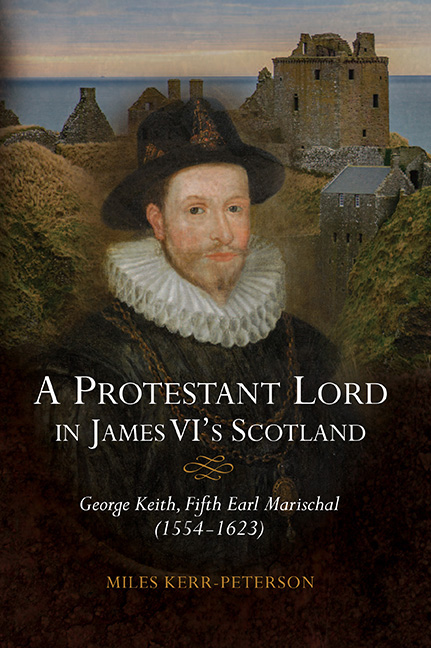Book contents
- Frontmatter
- Contents
- List of Illustrations
- Acknowledgements
- Conventions
- Abbreviations
- Map
- Introduction
- 1 Inheritance and Education, 1513–1582
- 2 Three Feuds and Jacobean Politics, 1582–1595
- 3 Service to the State, 1595–1623
- 4 Defending the Borders of the Earldom, 1595–1623
- 5 Family Strategies and Crises, 1595–1623
- 6 Lordship and the Reformed Kirk, 1560–1623
- 7 Economic Activities, 1581–1623
- 8 Marischal College, 1593–1623
- Conclusion
- Appendices: Genealogies
- Bibliography
- Index
- St Andrew Studies in Scottish History
3 - Service to the State, 1595–1623
Published online by Cambridge University Press: 13 April 2019
- Frontmatter
- Contents
- List of Illustrations
- Acknowledgements
- Conventions
- Abbreviations
- Map
- Introduction
- 1 Inheritance and Education, 1513–1582
- 2 Three Feuds and Jacobean Politics, 1582–1595
- 3 Service to the State, 1595–1623
- 4 Defending the Borders of the Earldom, 1595–1623
- 5 Family Strategies and Crises, 1595–1623
- 6 Lordship and the Reformed Kirk, 1560–1623
- 7 Economic Activities, 1581–1623
- 8 Marischal College, 1593–1623
- Conclusion
- Appendices: Genealogies
- Bibliography
- Index
- St Andrew Studies in Scottish History
Summary
As Marischal's feud with Huntly drew to a close, his participation in court politics declined sharply. He continued to attend court, but, with the threat from the centre lifted, Marischal concentrated the majority of his time and effort in the localities and, as we will see in chapter five, increasingly delegated his responsibilities to his son and heir. There would be other feuds, detailed in chapter four, but none would draw him into high politics in the same way. Most of the earl's activities at the royal court and centre of government therefore concerned his relationship with the king and his services to the state, the focus of this chapter. ‘Services to the state’ in this context refers to positions of power that Marischal held from the crown, such as his positions as marischal, as a member of the privy council or as hereditary sheriff of the Mearns.
There is a broad consensus that the reign of James VI saw far reaching changes in the relationship between the nobility and the state, as well as in the overall nature of government. Julian Goodare's study of the mechanisms of the Jacobean government perceived a growing intensification in the processes of state-building between 1560 and 1625, exaggerated by the Union of the Crowns, where the nobles were increasingly confined to advising the king or serving a more centralised royal government, rather than governing the localities on behalf of the king. This shift was achieved through interventions into the nobles’ old mechanisms of power, such as reforming sheriff courts. The nobility still retained a central role in the government of Scotland, while also maintaining their strong regional powerbases, meaning that the state was still essentially aristocratic, but their autonomy and power had been fundamentally eroded. Although this is largely seen as the outcome of James’ reign, its causes are more debatable. Julian Goodare emphasised the intentional development of government, while continuity has been stressed by Jenny Wormald and Keith Brown, who saw these changes as more to do with the end of a period of disruption caused by royal minority and civil war. For them, these changes were reactive and incremental, and not part of a self-consciously designed plan.
- Type
- Chapter
- Information
- A Protestant Lord in James VI's ScotlandGeorge Keith, Fifth Earl Marischal (1554–1623), pp. 72 - 90Publisher: Boydell & BrewerPrint publication year: 2019



